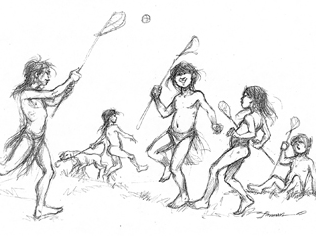As most of you know, I grew up in New York State. One of the more popular sports there originated from the Native American Iroquois tribe. This sport is Lacrosse.
There is no written documentation of when Lacrosse first originated, but oral accounts from Iroquois tribe members claim that it developed as early as the 5th century in the North East of the United States. It was originally called Baggataway.
Early games of lacrosse had as many as 500 to 1,000 men on a team. The field ranged from 500 yards to a couple of miles (depending on where they played). It typically began at sunrise and ended at sundown, but continued for two to three days. It involved men transporting a cloth ball (by using netted sticks) into one of two goal posts at the ends of the field.
 |
| Early game of lacrosse. |
Lacrosse, at that time, was considered a religious tradition and even part of a military training. It was a ceremonial ritual in which Iroquois men gave thanks to the Creator. It required deep Spiritual involvement and strategical focus. As part of military training, it gave the men an objective and required them to work as a team. Many times it would also settle disputes among the tribe, or between other tribes, with the winning side's favor.
The first documented lacrosse game was recorded by a French missionary, Jean de Brébeuf, in 1636. (Historical Timeline) He coined the term "Lacrosse," which actually came from "la crosse" meaning "the stick" in French. Since that time, the sport has evolved to having twelve players per team, a 110 yard field and a shorter playing period. Written rules and regulations have been made and focus is more on competition and skill, rather than religious reasons. However, with the new rules and regulations, it is still taught and played throughout the Iroquois tribe today.

Wow, a three day lacrosse game. That would be intense.
ReplyDeleteI was really interested in the fact that playing lacrosse was a spiritual ritual and military training. At first it was odd to me, but then I started thinking about the other games we play and realized that most of them originally served a different purpose. Chess was part of tactical training for Persian nobility. Dice were used for casting lots to make decisions and divination. The Aztecs had a game, Ullamaliztli, that reflected the battle between night and day; the game was significant in politics and religion. Really just about all the games we play had a different purpose before and it is easy to forget because often the original purpose was not recorded, just transmitted orally.
I love lacrosse. Used to play. Maybe if BYU's team had 500-1000 players i could have made it big. haha.
ReplyDeleteI had never really thought of the purposes of sports other than entertainment, but it is interesting how those games had their purpose. I imagine that the emergence of leisure time and the middle class really changed that aspect of sports. We just have a lot more time to waste than did our ancestors.
I was also thinking of how interesting it is how many ancient american cultures had a ball game as a ritual of some sort. Not only the Aztecs played it but the maya and toltec and many other cultures in mezoamerica. The game obviously changed from place to place and time to time but it was always pretty similar. Sometimes the stakes were pretty high too, meaning death to the losers.
Wow, sunrise to sundown. Crazy. I think it is interesting to look at where it was played and where it is popular now. Did lacrosse make some kind of come back, at some point? Or has it always been pretty popular back east?
ReplyDeleteMike--that is really interesting, that you mentioned many ancient American cultures having some sort of ball game with ritual meaning. Did cultures outside of the Americas have these ritual games as well? Or was it unique to the Americas?
Fun post. Thanks, Misa.
As far as I know, there weren't many ball games outside the Americas. They had other ritual games and events (gladiators, olympics, etc.) but not things that were quite this symbolic.
ReplyDeleteI agree with Mike's comment, on how leisure time has changed the purpose of events, and how they used to have to ritual significance, otherwise they wouldn't have occurred. But today, we still assign some significant cultural and social importance to sporting events and athletes. Some of the most highly paid people are professional athletes. And it becomes a matter of state, city, school, or team pride to be the best and win an arbitrary game. Are these carry overs from the roots of the games and their importance before, or have we taken the act and assigned our own purpose to them? Interesting ideas.